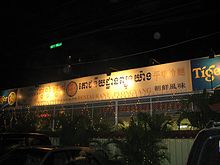Pyongyang (restaurant chain)

Pyongyang (Korean: 평양관) is a restaurant chain named after the capital of North Korea, with around 130 locations worldwide.[1][2] The restaurants are owned and operated by the Haedanghwa Group, an organization of the government of North Korea.[3]
Locations
[edit]Most Pyongyang restaurants are found near the North Korean border in China, as well as in Beijing and Shanghai. Since the 2000s, the chain has been expanding into South and Southeast Asian cities including Phnom Penh,[4] Siem Reap,[5] Ho Chi Minh City, Hanoi, Da Nang, Vientiane, Dhaka,[6] Jakarta,[7] and Kuala Lumpur.[8] There are also restaurants in Ulaanbaatar, Vladivostok, Moscow, Dubai, and Kathmandu. The restaurants initially catered to the many South Korean businessmen in Southeast Asia, and have now become popular with curious tourists.[9]
The first Western outpost of the restaurant chain was opened in Amsterdam in 2012, in the residential neighbourhood of Osdorp, along with Dutch co-owners.[10] The menu and policies of this restaurant differed from its Asian counterparts. However, in September 2012, amid mutual accusations between the Korean staff and the Dutch partner, the restaurant closed.[11] It reopened in December 2013 under the name Haedanghwa in a new location,[3] but closed a year later.
The restaurant's locations in Bangkok were temporarily shut down,[12] but were re-opened again in 2015[citation needed]. Similarly, their branches in Pattaya were closed down. The branch in Hanoi shut down in 2020.[13][14]
It was reported that a new branch was set to open in Scotland, in line with North Korean leader Kim Jong-un's interest in the country after its 2014 independence referendum, although this has been denied by North Korean officials.[15][16] According to Japan's Yomiuri Shimbun newspaper there are some 100 North Korean restaurants in China alone.[citation needed]
Service
[edit]
The restaurants serve Korean food, including kimchi dishes, Pyongyang cold noodles, barbecued cuttlefish and dog meat soup.[8] Patrons may also buy North Korean products such as ginseng wine and an unlabelled aphrodisiac claimed to be made from bears.[8] The prices are relatively high and in US dollars.[8]
The staff consists of young Korean women in traditional Chosŏn-ot dress, who also perform karaoke as well as song and dance routines in the style of the North Korean Mass Games for the customers.[8][17] Staff from North Korea typically work on three year contracts, and are often highly trained graduates of arts colleges.[4] Photography is generally not permitted inside.[4][8]
Operation
[edit]According to Swedish journalist Bertil Lintner, the restaurants are one of several overseas business ventures of Room 39, a North Korean government organization dedicated to acquiring and laundering foreign currency for the North Korean leadership.[8]
North Korean defectors have reported that the restaurants are run by local middlemen, who are required to send money every year to the North Korean government.[8][17] The North Korean staff, who live on the restaurant premises,[4] are said to be thoroughly screened for political loyalty and to be closely watched by on-site North Korean security agents.[8] In the 2000s, according to Daily NK, several attempted escapes by waitresses in China led to the closure of several restaurants and the repatriation of the staff.[18][19] In 2016, Chinese authorities announced that 13 restaurant workers had defected from Pyongyang restaurants in Сhina to South Korea.[20][21]
See also
[edit]References
[edit]- ^ Choe, Sang-Hun (13 April 2016). "North Korea Threatens South Korea over 13 Defectors". The New York Times. Retrieved 13 April 2016.
- ^ Taylor, Adam (April 8, 2016). "The weird world of North Korea's restaurants abroad". The Washington Post.
- ^ a b "DPRK Restaurant in Amsterdam Reopened Under New Ownership". North Korea Leadership Watch. Archived from the original on 5 September 2014. Retrieved 30 August 2014.
- ^ a b c d Ed Butler (7 June 2014). "Mort Pour La France". From Our Own Correspondent. 22:25s minutes in. BBC. Radio 4. Retrieved 7 June 2014.
- ^ "The bizarre experience of dining at an illegal North Korean restaurant". mic.com. 4 June 2018. Retrieved 23 April 2019.
- ^ Mitra, Devirupa. "Dining with Dear Leader in Dhaka". The Sunday Standard. New Indian Express. Archived from the original on January 22, 2014. Retrieved 20 May 2015.
- ^ Tash Roslin (May 6, 2010). "North Korea's Hidden Menu". Jakarta Globe. Retrieved March 10, 2014.
- ^ a b c d e f g h i Strangio, Sebastian (22 March 2010). "Kingdom Kim's Culinary Outposts: Inside the bizarre world of Asia's North Korean restaurant chain". Slate. Retrieved 23 March 2010.
- ^ "Pyongyang Restaurants Extending Reach in Southeast Asian Cities (public domain text as cited)". Voice of America, Khmer-English. Archived from the original on 2011-12-07. Retrieved January 13, 2012.
- ^ "Pyongyang Restaurant". Archived from the original on 2010-10-12.
- ^ "Noord-Koreaans restaurant al weer dicht". AT5 Nieuws (in Dutch). September 5, 2012. Retrieved September 6, 2012.
- ^ バンコク人気北朝鮮レストランが摘発され閉鎖 周辺国へ波及し年内北レス全滅か?(1/2). KoreaWorldTimes (in Japanese). 2019-12-06. Retrieved 2020-05-21.
- ^ 황, 석주 (2020-06-12). "Closed N.K. restaurant in Hanoi". Yonhap News Agency. Retrieved 2022-08-29.
- ^ "North Korean workers stuck in Vietnam following COVID-19 border closures: Hanoi". NK News. 2020-04-20. Retrieved 2022-08-29.
- ^ "Kim Jong-un 'set to open a new restaurant in SCOTLAND'". Daily Mirror. 11 January 2015.
- ^ "North Korea denies reports Kim Jong-un is to open state-backed restaurant in Scotland". The Independent. Retrieved 12 May 2015.
- ^ a b Kim, Min Se (19 June 2007). "North Korean Restaurants in China Send $10,000–30,000 Annually Back to Its Native Country". Daily NK. Retrieved 23 March 2010.
- ^ Kwon, Jeong Hyun (21 March 2007). "North Korean Restaurant in China Shuts Down as Receptionist Escapes". Daily NK. Retrieved 23 March 2010.
- ^ Kim, Yong Hun (15 December 2006). "Waitresses Flee North Korean Restaurants in Qingdao China". Daily NK. Retrieved 23 March 2010.
- ^ "North Korean staff at restaurant in third country defect to South". Reuters India. 8 April 2016. Archived from the original on 2018-05-26. Retrieved 2016-04-08.
- ^ "North Korean restaurant defectors 'were in China and left legally'". BBC News. 12 April 2016. Retrieved 12 April 2016.
